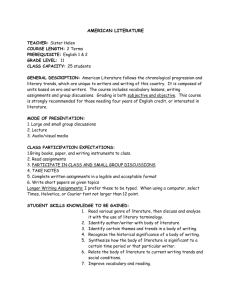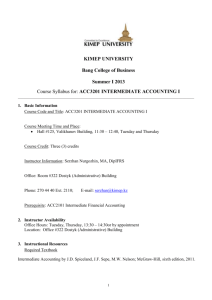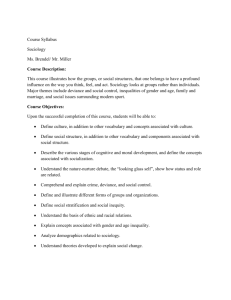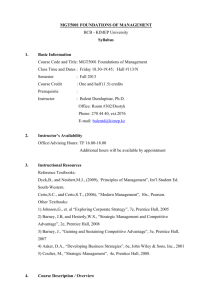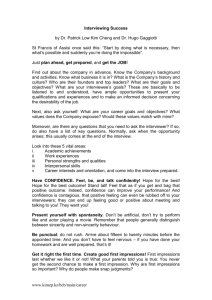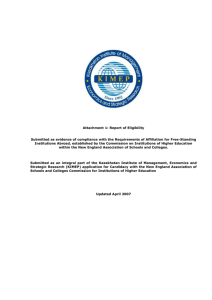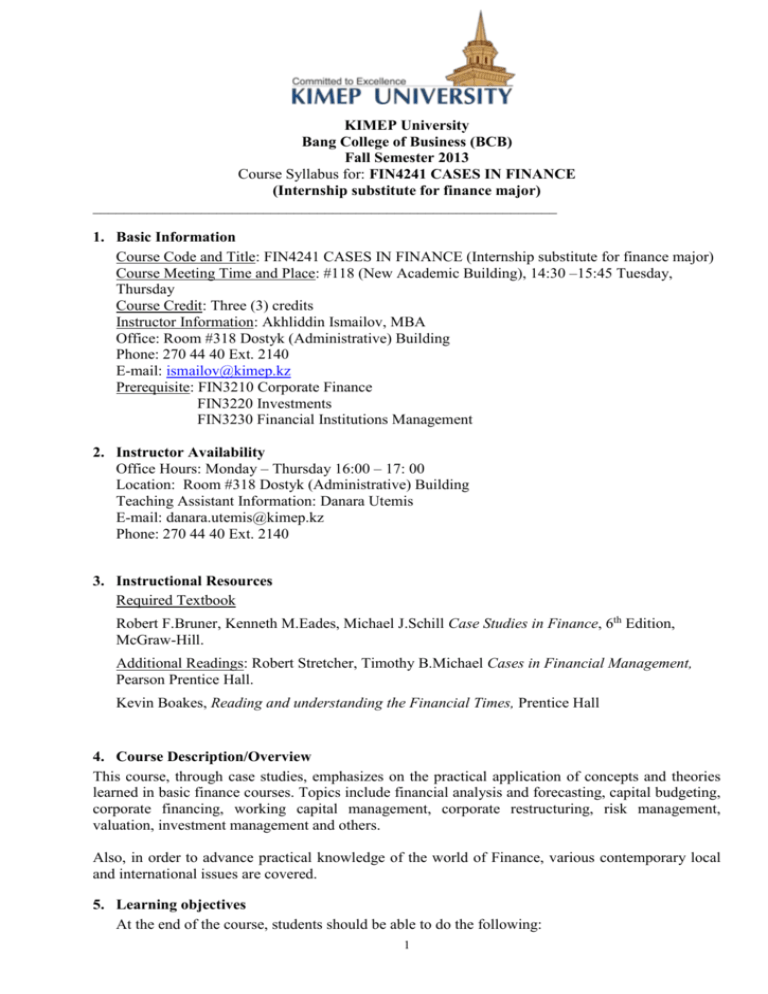
KIMEP University
Bang College of Business (BCB)
Fall Semester 2013
Course Syllabus for: FIN4241 CASES IN FINANCE
(Internship substitute for finance major)
____________________________________________________________
1. Basic Information
Course Code and Title: FIN4241 CASES IN FINANCE (Internship substitute for finance major)
Course Meeting Time and Place: #118 (New Academic Building), 14:30 –15:45 Tuesday,
Thursday
Course Credit: Three (3) credits
Instructor Information: Akhliddin Ismailov, MBA
Office: Room #318 Dostyk (Administrative) Building
Phone: 270 44 40 Ext. 2140
E-mail: ismailov@kimep.kz
Prerequisite: FIN3210 Corporate Finance
FIN3220 Investments
FIN3230 Financial Institutions Management
2. Instructor Availability
Office Hours: Monday – Thursday 16:00 – 17: 00
Location: Room #318 Dostyk (Administrative) Building
Teaching Assistant Information: Danara Utemis
E-mail: danara.utemis@kimep.kz
Phone: 270 44 40 Ext. 2140
3. Instructional Resources
Required Textbook
Robert F.Bruner, Kenneth M.Eades, Michael J.Schill Case Studies in Finance, 6th Edition,
McGraw-Hill.
Additional Readings: Robert Stretcher, Timothy B.Michael Cases in Financial Management,
Pearson Prentice Hall.
Kevin Boakes, Reading and understanding the Financial Times, Prentice Hall
4. Course Description/Overview
This course, through case studies, emphasizes on the practical application of concepts and theories
learned in basic finance courses. Topics include financial analysis and forecasting, capital budgeting,
corporate financing, working capital management, corporate restructuring, risk management,
valuation, investment management and others.
Also, in order to advance practical knowledge of the world of Finance, various contemporary local
and international issues are covered.
5. Learning objectives
At the end of the course, students should be able to do the following:
1
KNOWLEDGE: Students will have an understanding of
Practical knowledge of the world of finance
Application of theory to real business decisions
Practicality of finance theory in sorting out the issues facing managers
The importance of transparency of the firm to investors
SKILLS: Students will learnt to
Develop and exercise one’s own skills and judgment
Exercise the application of finance tools in business situations
Interpret capital market conditions across the economic cycle
Explore the design of financial securities
APPLICATION ABILITIES: Students will be able to
Improve problem-solving activities
Participate more effectively in future case discussions
Obtain a way of thinking about business situations
Develop understanding of the effects of any particular choice
VALUES AND ATTITUDES: Students practice
KIMEP Core Values
Academic honesty
Respect for peers and instructors
6. Teaching Methodology
The format of the course is basically lectures but also includes the following:
Case discussions
Homework assignments, case studies
7. Assessment Scheme
Continuous Assessment
Class Participation
Exams (4)
Home assignments (2)
TOTAL
Bonus
70%
30%
100%
ASSESSMENT IN DETAIL
Class Participation
Every class has an agenda and a purpose, so that the time that we spend together is used effectively
and efficiently. Every class will have assigned readings and tasks detailed and posted.
There are two factors that will determine your grade for class participation:
Quality, based on how effectively you move the discussion forward and the extent you show
mastery of assigned material.
Quantity, as a denominator and control threshold, so that all students are active and involved.
Other Continuous Assessment
(70%) Four exams, 17.5% each, to assess mastering course material.
(30%) Three home assignments, 15% each. Homework assigned must be turned in at the
beginning of the class.
2
8. Grading Scale
Letter grades for the course will follow the same standards as specified in the Catalog. See the
following table for grading scale:
Letter grade
A+
A
AB+
B
BC+
C
CD+
D
DF
Numerical scale or
percentile
90-100
85-89
80-84
77-79
73-76
70-72
67-69
63-66
60-62
57-59
53-56
50-52
Below 50
9. Course Policies and Instructor’s expectations of students
Students must attend 80% of the classes and those who are more than five minutes late will be
marked absent.
Academic honesty: We have a zero tolerance policy for academic dishonesty. Check the catalog for
details.
Cell phones: should be turned off at the beginning of the class, or put it on vibrate or silent mode (in
case of emergency).
Information dissemination: Information regarding this course and assignments will be given by the
instructor during the class or can be found on the L-drive.
No checking E-mails or surfing the Internet during the class.
Students are also expected to check their Umails.
Enrollment in the course constitutes an agreement with the terms and requirements in this syllabus.
10. Course objectives and their assessment
COURSE OBJECTIVES AND THEIR ASSESSMENT
Learning Outcomes
How they
taught
Understand the implications of transparency
of the firm to investors, and the impact of
news about the firm in an efficient market.
Case discussions, analysis of
cases
Homework,
analysis.
exam,
case
Understand the interpretation of capital
market conditions across the economic
cycle.
Case discussions, analysis of
cases
Homework,
analysis.
exam,
case
Understand the importance of financial
institutions in the capital markets.
Case discussions, analysis of
cases
Homework, case analysis,
exam.
Understand the immense practicality of
finance theory in sorting out the issues
facing financial managers.
Case discussions, analysis of
cases
Homework,
analysis
3
will
be How to assess
exam,
case
4


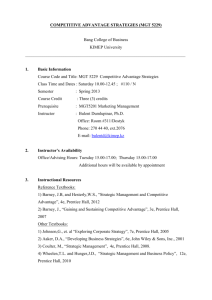
![Syllabus [Word]](http://s3.studylib.net/store/data/006967311_1-8dc868a12812e520f131dbbe02cc269a-300x300.png)
